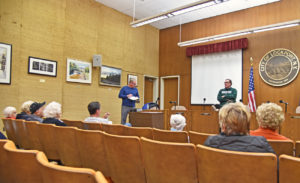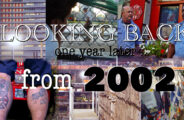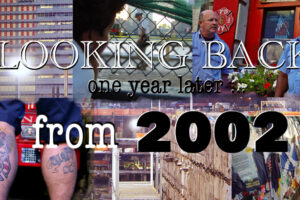Lockport’s challenges brought to forefront at double ward meeting
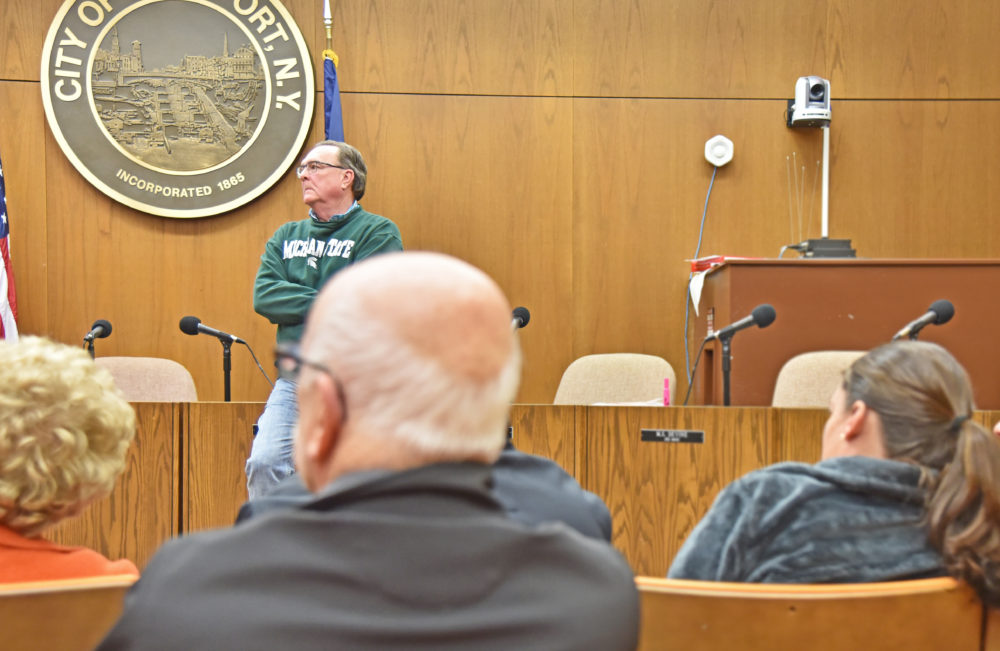
On Thursday, 1st Ward Alderman Joe Oates and 5th Ward Alderman Rick Abbott held a joint ward meeting in the council chambers at city hall.
Oates: “Any issues that you have, we are here to talk to you about them.”
The first resident speaks up. “I live in the 1st Ward on the Van Buren Street cul-de-sac. In the 12-13 years I’ve lived there, you’re the second or third alderman down there. Snowplowing. They plow the street but they don’t salt the street. It’s not safe. Sidewalks. Sidewalk shoveling. I walk a lot. I walk a dog. I walk a lot by myself. The city overall — not just the 1st Ward/Lowertown area — very few people shovel their sidewalks.”
“Zombie buildings. There’s a few of them around in Lowertown. I don’t know what you can do about it. I don’t know if it’s up to the mayor or whoever but it’s an eyesore.”
“There’a hole on Van Buren Street. 10 days now. Why did it take 10 days to fix it?”
“Streetlights. In Lowertown alone, I counted 23 burned-out lights. I talked to someone at NYSEG and he told me that the city is charged annually $250 per streetlight. If that’s the case — and 23 are burned out — that’s about four to five thousand the city is paying that they’re getting no use of.”
“I had to really twist their arm to get them down there. I had to twist NYSEG’s arm because the engineering department of the city didn’t do squat. I don’t even know what they are doing.”
2nd Ward Alderwoman Anita Mullane: “You went to the wrong department. I’ve had all the lights in my ward fixed. NYSEG has gone right over and turned them on as soon as you log a complaint with the city clerk. We take the number off the pole. She calls NYSEG. And they come over and they turn them on. I haven’t had a problem. I’ve been doing this for the past two years. I drive around my neighborhood, my ward, and I find any streetlights that are out. If they belong to the city, we send Josh Fiegl, our electrician. If it’s a NYSEG light, I take the numbers off the pole and I take a picture of it so I don’t forget the numbers. They are pretty good about going over to turn them back on.”
The resident also said that Mill Street and Market Street also had non-functioning streetlights.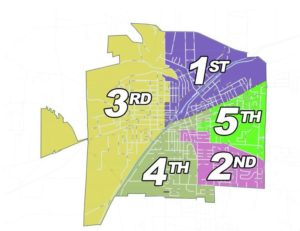
Abbot: “As for the zombie houses. We currently got a grant from the state for this year coming up for $150,000. Part of that money is going to be used to get a housing inspector who will be dedicated to the zombie program. They have been inventorying the properties throughout the city. When it originally started out — probably back in February — it was inventoried at about 28 houses. I inquired the other day and it’s currently up to 150 houses in the city. I don’t know if they all meet the definition of what a zombie house is. Zombie houses are basically foreclosed houses that are caught in limbo between the owner and the foreclosure and the bank.”
“Part of of program the city is working on is to write a law in regards to vacant properties. The people that are paying the taxes on a single-family house, if the house isn’t going to be kept up, they are going to adopt a law similar to what we do with the grass cutting. In that we would go in and make the corrections and then put it on the tax levy bill. That’s projected what they are going to do in 2017. So if you have a vacant house down there, call and give us the addresses and we’ll turn them in.”
The resident continued: “There’s another one where the people live there but they don’t take care of the property — at all. It’s an annual circus to get them to do something. The siding is falling off, the gutter is hanging down.”
Abbott: “And part of the problem — in my understanding — is that if you have a single-family house, if the owner of the house doesn’t let you in that house, then you don’t get entry.”
Resident: “What’s the city going to do about it?”
Oates: “We can go after the owner of the home, which is not the bank. And a lot of them are not here any more. So we don’t chase them down if they’re living in California, Utah. They might have bought them in an online auction. The city sends letters.”
Abbott: “There’s a big difference between single family and multiple dwellings. On the corner of Washburn and Genesee streets there’s a green house that been basically boarded up for a long period of time. The person who owns that house pays the taxes regularly. But he’s also in violation so they’ve issued a summons — actually issued a warrant for his arrest. He lives in California so he doesn’t obviously answer those. So it’s my understanding the city is moving forward, and part of it is changing the law. And because of the noncompliance it will give them bite to possibly foreclose on that house. That’s an example of where we’re trying to go.”
Resident: “Why is someone in California buying a property in the City of Lockport? Why can’t someone look at that and say that’s not a really good risk. This person may be an absentee landlord. Why does the city play ball with these people?”
Oates: “When they go to auction, it has to go to the highest bidder. They can do some of them on ‘best use.’ But you don’t know, he may be a good landlord.”
Abbot: “I’m not going to say all the zombie properties have building code violations. I know one house that’s been vacant for five or six years. People left the house and left the dinner on the table. But they pay the taxes. It’s been rumored there might be damage on the inside. But you can’t get access to it unless you have a court order. But they’re paying their taxes. It’s been a huge neighborhood problem.”
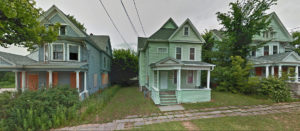
These vacant houses on Genesee Street are three of the at least 150 “zombie properties” in the City of Lockport.
Oates: “In all the neighborhoods. And the other problem is that First Niagara might have owned the mortgage. And they just sold to Key Bank so all the paperwork was with First Niagara. Now you have to start the process all over again.”
Abbot: “There are a couple of different proposals. The most innovative one is from Batavia. Batavia will foreclose on the houses and then they encourage people in the community to purchase that house. And if they fix it up and they make the improvements to the house, and they’ve lived there, they will only pay the taxes on what the assessment was when they bought it until they move and then the assessment goes up. But it encourages people to move into those houses and live in those houses. We looked at the Town of Niagara, and apparently they are in the preliminary stages of adopting something similar to that. Right now, our focus is on the legislation and the grant, and we need to come up with a program.”
Another resident speaks:
“The place that I lived in before was on South Street. There was over 100 apartments over there. 18 people moved out when the new buyer bought in because they did not take care of it. It is going down. I was there and I moved. It is going down very fast.”
Abbot: “Those people all voted for me by the way. And lot of them were concerned because some of the people have lived there 20 years. They raised the rent and took out the pool.”
The resident continued:
“Friendly’s. That’s not going to be taxable. YWCA. Nontaxable. You go up a little farther and next to the Palace Theater, and I don’t think that’s taxed. You go across the street, the post office, nontaxable. You go to the next one and that one is owned by the county. And on top of that you have a fourth of the rest of Main Street that is not rented. Main is not Main Street. You’ve got a downtown business. I’ll use Kathy O’ Keefe as an example, and I’ve known her for years and probably one of the hardest working people I know. Now she needs a new roof. We can’t help her because she’s not in the downtown business district. There is nothing in the business district at all except non-taxable properties or vacant buildings.”
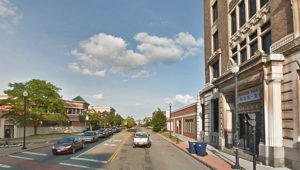
The number of non-taxable tenants and vacant properties on Main Street was a topic of discussion at the double ward meeting.
“Downtown gave $30,000 to put a new sidewalk in for an ice cream parlor. A year and a half later, she’s out of business. Now from what I understand, she’s running the downtown business association and the person that was running that — who didn’t bring any business into downtown — is going over to Harrison’s. I don’t understand. Kathy O’Keefe. The city doesn’t help her. When Market Street Art Center was in business and another person bought it, they never got any money. The Canal Association. The Canal. Same thing. Why are we giving money to Main Street and downtown when there’s no downtown? It’s ridiculous. We should expand that money and give it to the people that are trying to stay in business and don’t just because they aren’t in a certain section of the city.”
Oates: “The loans or the grants are targeted by areas. We have asked them to expand the areas out now. But your chances of getting them when you expand out are not as good because they don’t fall into the categories of all these different grants.”
Abbot: “You brought up Friendly’s. That’s a private sale and they decided to go to auction. The city has no control over private sales of property.”
Oates: “The county worked a payment agreement because they knew we needed the tax dollars but that’s only for so long. I don’t think there’s anything we can do to change the tax laws unless the state changes them to make these exempt groups pay taxes.”
Resident: “What about the parking lot at Friendly’s?”
Oates: “Some of it belongs to the city.”
Abbot: “Some of the parking goes with Friendly’s. That’s their parking lot. We sometimes use their parking lot for city functions. But I believe our lot is just the front spaces that are perpendicular to the sidewalk.”
Oates: “The city parking lot is on the bridge.”
Resident: “Before we give out this free money that they don’t have to pay back we should look to find out if they’re a good business risk. An ice cream business was a not good business.”
Oates: “That’s not city money. They gave money to the other ice cream parlor down here and business is booming.”
Resident Jean Kinney: “I really feel that’s it’s been a very loosely overlooked program. I’m not taking issue with either of you alderman. There were huge grants that were given to individuals. For example, the coffee shop on Chestnut Street. Think of the tens of thousands of dollars that went into that. It’s been a very loosely looked at program and I feel everything that Phyllis had to say is totally correct.”
“But my reason for being here tonight is in regards to the Legionaire’s. I have been very concerned about this whole thing. We have approximately 20,000 population in the city. And we were not advised of this cluster of cases. Now I truly understand confidentiality. The patients names I am not interested in at all. But I am interested in the fact that it was known there were three cases from (inaudible), one case from Lake Avenue, one from East Avenue, and I do believe one from Avondale, which should have raised a red flag that we in this community had a situation which truly needed to be looked into.”
“And if it hadn’t been for Tom Prohaska and the article that he had in the paper approximately two weeks on this Sunday, we still wouldn’t have known about it. And to me I think that it’s criminal. I think that’s absolutely an injustice to we who live here in this community.”
Oates: “The health department is the lead agency on this whole thing.”
Kinney: “But it’s been all around the mulberry bush with regard to the fact they have been tested positive for (inaudible) on the hospital. We need to test Van De Mark. We need to test Wyndham Lawn. These new regulations came into being in February as to the testing of the water situation. But when you have these people all in close proximity not bringing this up before the public is wrong. We have an individual here who would like to talk on it later.”
“There’s a tax increase, which I understand we are facing. I dearly love the police department. I really do in particular I love the police chief. I think he’s wonderful. But I think we need to know how much of the budget is being directed toward the police department.”
“The other thing I want to bring up because she won’t bring it up, but the lead content in Shirley Nicholas’ back yard is 1900. Normal is 400. A week ago Wednesday, the gentlemen from the federal government was there in her back yard again doing testing. We need a better surveillance by the people who have the authority and are being paid to watch out for the health of the community.”
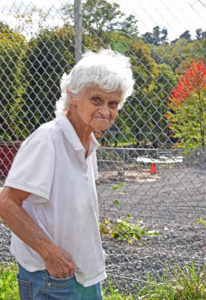
Shirley Nicholas in front of the former Flintkote building, which due to her campaigning was demolished and the site remediated. “The EPA has been pretty good to me but now they are trying to tell me that if the DNA of the lead in my backyard doesn’t match the DNA of lead over by 18 Mile Creek, they’ll do nothing for me,” she said.
Oates: “So the EPA is not doing their job?”
Kinney: “I am saying the fact that they knew the samples from her backyard were in excess on 1900 and normal is 400, what do you think? Do you think that’s right? And I had an opportunity to talk with that young couple over on Waters Street on Sunday. Their water is still running yellow. So what’s the answer to that? Wouldn’t you think you’d run a pipe down from Jackson Street or something so the water isn’t yellow?”
Oates: “The EPA is the lead agency on that with all the testing in that area. And the DEC is doing the cleanup of that oil tank. They are supposed to be doing that within the next month.”
Shirley Nicholas: “The DEC man gave me a song a dance. I’d like to have his job. He doesn’t deserve it. I was very nice and very polite. And he gave his song and dance. I said very politely, ‘Sir, when you get a result would you kindly pick up the phone and call me?’”
“I don’t call people like you,’ he said, and hung up on me. Wrong! I don’t put up with that kind of stuff. I don’t deserve it. None of us deserve to be treated like that.”
At-Large Alderman Joe O’Shaughnessy: “Shirley, I’m sorry. I’ve known Mr. Colandra for probably 30 years because I was part of the DEC. It was supposed to (the 20,000-gallon tank buried underground at 89 Mill Street and leaking toxic oil) be pulled out of there by the end of October. Two weeks ago whatever I said to Shirley, when I talked to Sal, and he said, ‘Joe, I don’t think it’s going to get done by the end of October.’ So I gave Shirley his number. Either he had a bad day or something.”
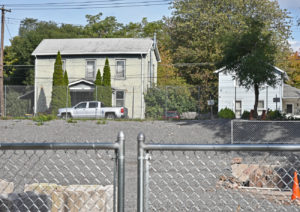
Shirley Nicholas’ house, left, which is across the street from the former Flintkote plant. Soil samples indicate her backyard has abnormally high lead content.
Nicholas: “No!”
Joe O’Shaughnessy: “He mistreated Shirley, and to mistreat Shirley is a detriment to this whole city. She has worked so hard on so many things. So, first of November again I will call Sal, but we have to have that out of there before the frost. It’s got to come out of the before the frost. Sal said we are second in line. There’s another clean up being done and we are right behind that one. There’s some problems with that first cleanup but it’s moving forward.”
Shirley: “I’m not the only woman he’s treated like this too. I have news for you. I went and had a very nice interview with our mayor today and she’s treated by him the same way. And she’s the mayor. She’s a woman.”
Nicholas: “The EPA has been pretty good to me but now they are trying to tell me that if the DNA of the lead in my backyard doesn’t match the DNA of lead over by 18 Mile Creek, they’ll do nothing for me. So now what do I do? I used to have a garden out there. Huge! As big as this room. And my neighbors came and planted stuff in it. I planted it. My tenant planted in it. But I shut it down. It’s grass now. Because it’s 1900.”
Oates (asking other councillors): “Can we can approach them for more buyouts down there? Is that something we can do?”
Shirley: “Where would I go?”
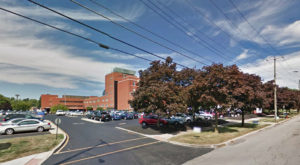
Lockport Memorial Hospital on East Avenue
Another resident speaks: “Unfortunately, I am one of the eight (residents with Legionnaire’s ) they keep discussing. I am in the health care field so I understand HIPPA regulations. But why can’t we know as a community what streets? I’m on Lakeview. There’s 33 houses. Process of elimination is kind of tough. Let’s know the streets, and the reason why I ask is to not further implicate (inaudible) because we are all around Lockport Hospital.”
Oates: “The Niagara County Health Department is the lead agency. The state health department oversees all the hospitals in the state. They are done testing. They are waiting for some tests to come back.”
Resident: “I have my friend here that had pneumonia. She didn’t go through the process of being admitted to the hospital. She just went to her general practitioner. I don’t know if general practitioners are mandated to do urine tests and test for Legionnaire’s. The hospitals have considerable testing with the urinalysis. The Lockport Hospital — when you’re admitted — for most protocols they have to. Once they get that urinalysis it’s tested positive for Legionnaire’s they have to send those results to the department of health. There could be 30, 40 one hundred cases and the state might not know because those people were not admitted to the hospital through those certain protocols. Mine was. And a couple of other people were admitted. And that’s how they found out about our particular Legionnaire’s. So let us know what streets these people are on.”
Oates: “We don’t know. You just explained more probably because they can only say a little bit. From what I understand they put something in the paper.”
Resident: “They did long after and it was tiny. But ir wasn’t about patients it was about the water cooling tower.”
Abbot: “It’s a relatively new regulation, and they have to test, and it’s done in September. Those tests, I understand, they self-identified as part of the new regulations. Their sample came back positive and they reported it as part of the regulation. And at that point they reported it to the health department. And then the cluster was identified with that. In the meantime, they disinfected the tower. Then they retested the tower and the tower tested negative. It would lead one to believe they are all related. They are trying to grow that bacteria in Albany and then they are going to do a DNA on the bacteria from the bacteria of the people who had been infected. But they have not been successful in growing that medium to do that test.”
Resident: “There’s a two-week incubation period. I had my urine sample on Sept. 9th. I was notified by the Dept. of Health 10 days later that my results were positive. The gentleman who died, died in July.”
Abbott: “We don’t know how long the water tower was positive.”
Resident: “It doesn’t take a rocket scientists to say maybe they should look at this neighborhood and see if it’s a source of Legionnaire’s.”
Abbott: “What complicates the whole thing is that the Lockport Hospital has not released a public statement in regard to what they’ve done.”
Another resident at the meeting said he was diagnosed wth Legionnaire’s in September.
Abbot: “All these questions should be directed to the health department.”
Another resident: “Who’s going to automatically admit that it was their fault? Do you know the lawsuits that’s going to come out of this?”
The resident who contracted Legionnaire’s: “Too late.”
Resident: “Does anybody know of any cases outside of a mile or so of the Lockport Hospital?”
Audience murmurs: No.
Kinney: ”This has been nothing but a smokescreen done on this community. And now that I’m an old lady I don’t care. If I think it’s wrong so help me I’m down there and I’m going to say ‘It’s wrong’ to everybody. And it’s not great for anybody that’s sitting in this room.”
“And the other thing that isn’t right is for this girl, who owns the apartment house there on South Transit. For a year and half they are trying to get an answer whether that property is contaminated with coal tar. A year and a half. You tell me why? If you can’t get that answer back there’s only one answer. That property would be contaminated with coal tar. Right next door to the Gas and Electric building.”
O’Shaughnessy: “If I can just address a couple of things. Number one, I have tried to support the nurses at Lockport Hospital for about the last year. There’s more things going on there than a lot of people in this community know.”
O’Shaughnessy: “Every one of you council people are here. We are here for a reason. Because of the fact that we understand where you’re coming from. But people, you have to understand, we are not more knowledgable than you. We only can can accept the information that we are given. We understand this because we have the possibility of getting sick like everybody else in this room. And we don’t want to do this. We are trying to get the information. The bottom line is we’re not getting the information any better than you. So unless we can get the health department together to try and give us this information or the state health department we are in deep trouble. We are here to try and represent.”
O’Shaughnessy: “So you know, there’s been some discrepancies within the council on many factors. But when it comes to being all together — on something that means our lives — that’s why we are here together.”
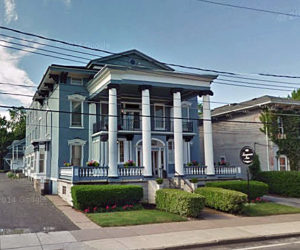
The Tuscarora Inn on Walnut Street
Resident: “I wanted to touch back on what Jean said about the Tuscarora Club and giving $200,000. And basically it was a functioning restaurant until the GLDC (Greater Lockport Development Corporation) — and I wish Dave Wohleben hadn’t left — because it was a functioning restaurant until they foreclosed on the DeFlippo family. It was running. The restaurant was open. People were going in and out of there. And now we are going to give them $200,000, and I understand that it’s alleged that they’ve never made a payment on the $253,000 that was loaned to the DeFlippo family to start the business there and get the inn going again. Now we are going to do $200,000. We’re going to take the GLDC money and we’re going to put it in a place that’s now failed twice to see if it’s a viable business. And on top of it, if you ever tried to go to Sugar and Cream and they said their family situation didn’t allow it to run, and now this is the person that’s supposed to be marketing our city. If they couldn’t figure out how to make a business that they already opened run because they had a family situation it seems to me that’s not the person we want shepherding this large amount of money. If we are giving $200,000 to someone, let’s give it to a business that’s coming in — not on a place that’s already failed twice. I think we should put that $200,000 in Harrison Place and use the money where it’s targeted. There’s five restaurants that have come and gone across the street next to Lock 34. If there’s a need for a restaurant down there, private industry will fill it.”
“It seems to me that we have a lot of common threads among the people that run the city and run the hospital and run the non-for-profits in this area. It seems like it’s the same group of people that we can never get any information out of. And I don’t think we should be spending good GLDC money that we earned through Canal Street and blow it on a possibility of having the Tuscarora Club come back. We are subsidizing a private business.”
Another resident, Dave Licata speaks: “None of the Aldermen have had anything to do with what I’m about to complain about. I’m not attacking you. But Urban Park Towers does not belong downtown. (murmurs of agreement). If you can take that frontage and turn it into retail. Make hotel suites or better apartments. I think that would do a lot for Main Street. I feel — and it’s just my opinion – that anybody looking at Friendly’s, looked two blocks down the street and saw people sitting there all day nursing their cup of coffee.”
Another man says, “I don’t think you’ll hear anyone disagree with you.”
Resident: “Friendly’s wouldn’t be an issue if things were more commercial on Main Street.”
Another resident: “We have the control over this one, and we are going to throw this money down a rat hole. We have a restaurant right across the street that’s closed. We’ve lost Mericana. We lost the Indian restaurant.”
Oates: “But we don’t control the GLDC.”
Resident: “But you do control the GLDC because he (Wohleben) sits on the board, sitting right next to Joe, and he left. You do control the GLDC. You fill the board. (Former Mayor) Mike Tucker used to be the president of the GLDC.”
Oates: “The GLDC controls their own money. They bring in their own income. We only approve the grant.”
Licata: “When that woman opened up the coffeeshop at Chestnut and Washburn, I was in the coffee business. I was wholesaling all kinds of coffee. I had the syrups for the Italian cappuccinos, Italian soft drinks. I had everything she wanted. My tail was wagging at 45 beats a minute. I was so happy she got that I went over to her to make a sales call, and she said, ‘I’m getting my coffee from Canada.’”
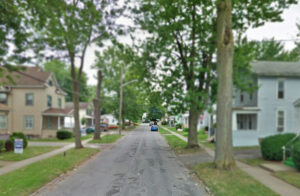
A resident from Cave Street said the problems there are widespread throughout the city.
Another resident: “I live on Cave Street. I’ve lived there for about 15 years. We have drugs. We have prostitution. Now I hear we have a gang with guns. What is being done about this. This is nothing new. It’s widespread in the city. If you don’t think you have drugs in your neighborhood, you are probably not paying attention. Are we coming up with some sort of plan to deal with this? I personally don’t have time to sit at home and watch my neighborhood and take down license plate numbers.”
Abbott: “I’m on the police board, and I’ll take that to the Chief. I talk to him on a regular basis.”
Another resident: “We’ve talked to the police. We’ve called. And everyone of us has called and called. And I’ve had police officers say, ‘Take down their license plate number. Take pictures.” And I’m like, ‘I don’t want to get shot.’ We have little kids around us, too. We have one guy, it’s just like a drug store. You go out after dark and there are cars pulling up, taking off. I’ve seen people dealing drugs right in the street. They’ve become very bold about it. They don’t care who’s watching. By the time you would call the police, they would be gone. They’re gone.”
Abbott: “I’ll talk to the police chief about it.”
Another resident: “It’s the same story on Allen street. Same story. They set up a table. They had a drive-thru one night.”
Anita Mullane: “I’ve always been of the mind that if we can clean up our housing those people will leave.”
Another resident: “I went to the meeting you had in Lowertown during the summer and still can’t believe that little kid in the rusty water. At that meeting I shared that the City of Niagara Falls, which you could label as dysfunctional as they come, they were able to provide clean drinking water to houses — because the lines froze — by running garden hoses from houses with water to a house that didn’t have water. And I can’t believe you can’t get a garden hose from a house to that house where that little kid is still taking a bath in rusty water. And the city knows about it. The city has installed some flushing equipment; Pat Schrader explained to me all about it. We know about this problem. And there’s still rusty water down there and it boggles my mind that we can’t get that done.”
“Joe O’Shaughnessy has been working on getting that oil tank out and god bless us that we have Joe O’Shaughnessy working on things. But my point is that Joe O’Shaughnessy shouldn’t be leading the fight to get that oil tank out. Senator Ortt should be leading the fight to get the oil tank out because Senator Ortt is the boss of the DEC. We can’t expect the City of Lockport to take care of Legionnaire’s disease; they don’t have the resources. We have all paid for those resources and it’s the county health department that should have taken care of this. And you’ve got a county legislator or two or three that’s not here.”
Another voice: “They never are.”
Resident continues: “There’s a County Health Department director that you pay that should have notified somebody that a person just died next to the hospital in July. And here this poor woman catches this disease in September. These guys don’t have all the answers. But thank god they are here tonight to listen to us and share our thoughts.”
“We have state representatives. We have county representatives. They don’t hold a meeting like this. We have to go to them. Senator Ortt is running around going to all the firehalls, going to all the guns clubs, doing whatever he does. And Joe O’Shaughnessy is getting the run around. Shirley is getting insulted by a guy who Senator Ortt could put out of work. Where is he? Why aren’t we calling him? You guys need to get on these elected officials. And when you call Senator Ortt’s office, he’d better listen. Because you are also part of the big political machine that’s going to endorse Senator Ortt maybe someday. And he needs to know you’re not going to if he doesn’t come down here and help us out. That kid should not be taking a bath in rusty bathwater. That just boggles my mind that we are that ineffective and our city government can’t run a garden hose from a house to another house so that guy has clean water. The City of Niagara Falls did it for a whole street all winter because the pipes were frozen.”
Abbott: “So now that we’ve listened to everybody. Has anybody seen any positive things?
Laughter follows. “Main Street looks great paved,” said one resident.
“We are here,” said another.
